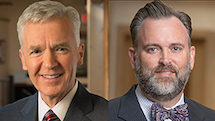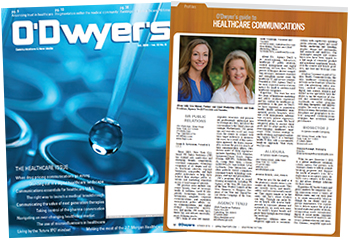 David Jarrard and Reed Smith David Jarrard and Reed Smith |
We’re a consumer-driven society. It’s a fact of life that comes with pros and cons for today’s PR agency. Today, agencies have a significant opportunity to build trust and grow their business by managing—and catering to—the right consumer expectations and behaviors, while recalibrating thinking on behaviors that aren’t helpful.
Consumers today don’t delineate between industries. They’ve been given convenience in their transportation (Uber, Lyft), purchasing (Amazon) and travel (Hotels.com). As a result, they’ve come to expect convenience in other aspects of life. For example, as a firm exclusively devoted to healthcare, we see healthcare providers struggling to implement what—to other industries—are relatively basic features: online scheduling, easy-pay methods, etc. Meanwhile, consumers aren’t comparing one hospital or doctor with another, they’re comparing their doctor with GrubHub. When those comparisons reveal gaps, frustration grows.
 |
| This article is featured in O'Dwyer's Oct. '19 Healthcare & Medical PR Magazine. |
To combat this problem, consumer-facing businesses have been buying up any and all tools to plug the gaps. Which has turned into its own problem. We just keep buying things instead of understanding what the need is. We’ve bought off the promise of a technology vendor. Too often, that promise is to alleviate our need to be smart about a subject or to hire more people. In other words, we’re asking technology to make our lives easier, to take some of the responsibility off us, to solve our needs instead of those of our customers.
The result? We’ve reached a strange place where we look up and all we’ve really accomplished is acquire a lot of technology. We haven’t solved the real problems, and we don’t have tools that fit together.
Take the venerable customer relationship management system or software. It was introduced to help manage long sales cycles and repetitive transactions. Very quickly, the CRM was mythologized as a silver bullet. Marketing got excited because now there was a streamlined, “easy” way to show ROI. And while most of that is true—and good—the assumption that a strong CRM will make it all easy isn’t. CRMs don’t alleviate the need for more employees, they necessitate more. Someone has to know how to use it, and it doesn’t hurt to have a data scientist or two on staff to really figure out what it all means. That’s not inherently bad, it’s just not what we perceived the promise to be.
Enough of the bad news. The intentions were good, the consequences not quite what we expected. So, how do we get back to where we were originally headed: Convenience for customers and streamlined operations for our agencies.
It starts with a very simple question: “Do we need all of this?”
Let’s return to defining our objectives and setting our goals. Instead of looking to plug gaps and duct tape together solutions, let’s focus first on the big picture of what we’re trying to accomplish and work back from there to the technology we need. The next step is to consider interoperability. Do the tools we have—or are considering—work together? Do we really need 47 logins or can we cut down on the number of disparate systems?
We then have to do the same thing for our clients. As a good steward of our clients’ dollars, we need to be smarter about their technology, what it does, what it doesn’t do and what promises are real. It’s easy to look for short-term fixes, but those are, tautologically, not going to last. Our clients need smart advice that allows them to accomplish their goals in a strategic fashion.
One option here is to create a different model where the agency maintains the relationship with the technology vendor. We can serve as a buffer between the tyranny of our clients’ urgent need to plug gaps and the many point-solutions out there. Intermediaries aren’t very popular in today’s convenience-driven consumer world—see mattresses, home security and investing platforms—but sometimes having one is the right thing to do. In this case, our agencies can take care of the due diligence and contextualize the information for our clients. We could possibly even manage the tools for them, and thereby protect them from themselves. Because convenience isn’t having more things, it’s having the right things.
***
David Jarrard is Founding Partner and CEO at Jarrard Phillips Cate & Hancock. Reed Smith is Vice President of Digital Strategy at Jarrard Phillips Cate & Hancock.


 Lo Isidro, senior director at Real Chemistry with more than a decade of strategic communications and PA experience, has joined Narrative Strategies.
Lo Isidro, senior director at Real Chemistry with more than a decade of strategic communications and PA experience, has joined Narrative Strategies. Nelson Fernandez, former North American chair of APCO Worldwide and managing director of Burson-Marsteller, has joined Volunteers in Medicine Berkshires as director of communications and PA.
Nelson Fernandez, former North American chair of APCO Worldwide and managing director of Burson-Marsteller, has joined Volunteers in Medicine Berkshires as director of communications and PA. Lilit Bargar, who was most recently an EVP in the healthcare practice at Weber Shandwick, comes on board at GCI Health as EVP, corporate practice lead.
Lilit Bargar, who was most recently an EVP in the healthcare practice at Weber Shandwick, comes on board at GCI Health as EVP, corporate practice lead.
 Five ways that successful thought leaders are made.
Five ways that successful thought leaders are made.


 Have a comment? Send it to
Have a comment? Send it to 
No comments have been submitted for this story yet.